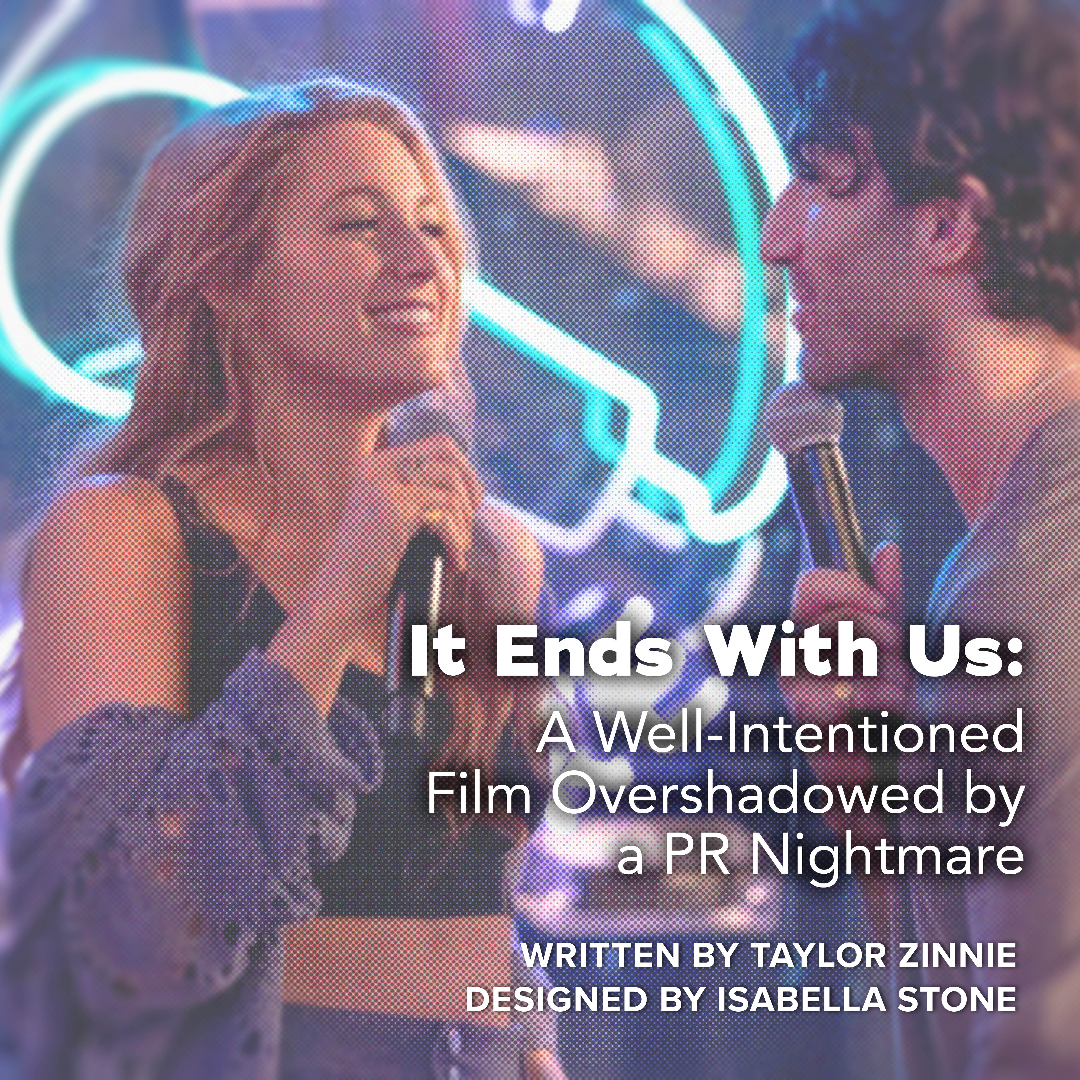
On Aug. 9, “It Ends With Us” debuted in theaters nationwide. The movie was an instant box office hit, quickly becoming the highest-earning romantic drama since 2018. With big names such as Blake Lively and Justin Baldoni heading the cast, it was no surprise that the film captured the attention of fans globally. However, it is the film’s disastrous marketing that is making headlines, not its important subject matter.
“It Ends With Us” is the highly-anticipated film adaptation of Colleen Hoover’s bestselling 2016 novel by the same name. The film stars Lively as protagonist Lily Bloom, an aspiring florist who is ready to take on life after college and escape the trauma of her past. After a chance encounter that ignites a passionate relationship with neurosurgeon Ryle Kincaid, played by Baldoni, Lily can feel her life falling into place. Just when it seems like she has it all — a prospering business, a budding relationship, a fresh start — the facade begins to falter, revealing a side of Ryle that is reminiscent of her father’s abusive tendencies.
After the novel was criticized for romanticizing abuse, fans were eager to see if the film could shift the narrative by spotlighting a powerful portrayal of domestic abuse and its complexities. Unfortunately, much of the conversation veered away from the core message of the movie, centering instead on Lively’s unconventional and somewhat distasteful approach to promoting the film.
Some of the marketing material for the film has been perceived to be making light of the heavy subject matter. In a promotional TikTok, Lively encouraged fans to “Grab your friends, wear your florals, and head out to see it!” Lively’s comment understandably left a bad taste in the mouth of many viewers who felt as though the actress was marketing “It Ends With Us” as an easygoing romantic comedy, overlooking the central theme of cyclical abuse. This criticism was echoed across social media, with fans expressing displeasure that she chose to forgo the opportunity to bring awareness to survivors of domestic violence.
The minimization of the topic of abuse emerges as a pattern when scrutinizing Lively’s behavior during the film’s press tour. Seemingly shining a light on everything besides the film’s content, she has used the publicity to cross-promote both her hair care brand and her drink company, as well as plug her husband, Ryan Reynolds’ recently released movie, “Deadpool & Wolverine.” One particularly dismissive interview moment gained traction on social media, garnering much surprise at Lively’s apparent insensitivity. When asked how viewers who resonate with the content of the movie may best approach her for a conversation, Lively flippantly trivializes the question, joking that fans can ask for her address or phone number.
While many of the headlines about “It Ends With Us” have revolved around Lively’s comments, a distinct contrast appears when considering Baldoni’s media appearances. His promotion of the film was notably separate from the rest of the cast; the actor also failed to appear in any photos with his co-stars at the film’s New York City premiere.
Overall, Baldoni has handled the film’s promotion in a much more thoughtful way, sharing resources on his social media and directing focus to the core message of domestic abuse awareness. In a premiere red carpet interview, Baldoni said “This is a night for all the women we made this movie for.” Being both the male lead and the director of the movie, it is refreshing that at least one pivotal cast member used their role to uplift survivors, sparking a meaningful conversation that could provide support and healing.
Lively’s behavior during the marketing campaign for “It Ends With Us” signals a dramatic tone deafness. She has sold the movie to be nothing more than perfect for girls’ night, failing to use her platform to create a space for important conversations about the prevalent issue of intimate partner violence. Prompting fans to dress up and gather friends to view an emotional portrayal of abuse is at best a product of obliviousness and at worst an off-putting display of insensitivity.
Baldoni’s compassion juxtaposes Lively’s lack thereof, serving as a display of what fans expected from the woman who brought the experience of a survivor to life onscreen. It is hard to believe that an actress can completely miss the premise of a movie she spent months both producing and starring in, suggesting that Lively is in fact making the conscious choice to capitalize off a narrative of hostility.
The lack of emotional intelligence underscores a dire need for sensitivity training for those acting in movies with difficult subject matter. The media frenzy that was ignited by Lively shifted the public’s attention from the movie’s central theme, stripping the film of its potential to uplift survivors of domestic abuse. “It Ends With Us” is a story about survival and resilience that was dishearteningly overshadowed by its cataclysmic press tour. When celebrity controversy takes precedence over the critical issues films are meant to explore, the opportunity for real change to be made is lost.